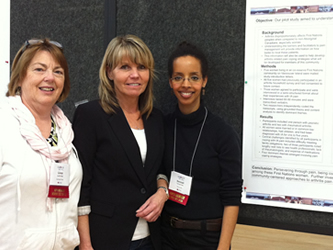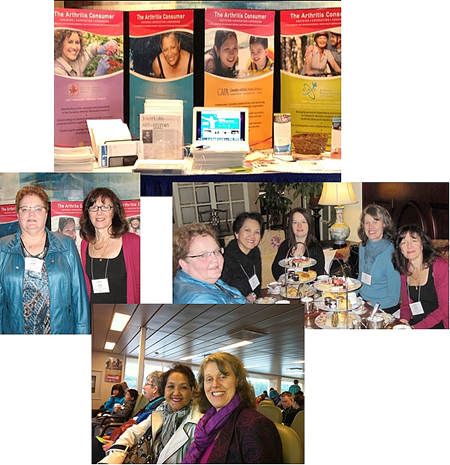The Arthritis Newsletter
Summer 2012Arthritis Patients Work Together at the Canadian Rheumatology Association's 2012 Conference
 Consumer Advisory Board (CAB) members Sheila Kerr, Nadia Prestley, and Joyce Ma attended the Canadian Rheumatology Association’s 2012 Conference in Victoria, B.C. This annual event provides a unique opportunity for arthritis patients to communicate with medical experts in the field of rheumatology. Interactions with these experts (rheumatologists, physical therapists, occupational therapists, and other healthcare professionals) proved as interesting as the many informative conference workshops and presentations taking place over the course of the three-day meeting.
Consumer Advisory Board (CAB) members Sheila Kerr, Nadia Prestley, and Joyce Ma attended the Canadian Rheumatology Association’s 2012 Conference in Victoria, B.C. This annual event provides a unique opportunity for arthritis patients to communicate with medical experts in the field of rheumatology. Interactions with these experts (rheumatologists, physical therapists, occupational therapists, and other healthcare professionals) proved as interesting as the many informative conference workshops and presentations taking place over the course of the three-day meeting.
Sheila, Nadia and Joyce shared a presentation table with other consumer organizations: Johanna Kendall, Arthritis Consumer Experts (ACE) and Janet Gunderson, Consumer Advisory Council (CAC). United in the cause of representing and expanding consumer participation in arthritis research and treatment, the consumers also promoted their organizations’ publications and resources to health care professionals for the benefit of arthritis patients. Empowering the patient was the underlying promotional theme. The ultimate goal? To provide patients with timely and accurate information and resources they can understand and use to improve the quality of their lives. The conversations were not one-directional, as health care professionals were willing to share their encouragement and their views on how best to meet their patients’ education needs.
The conference presentations introduced new concepts, treatment paradigms and guidelines in rheumatic diseases. The consumers were eager to “take it all in”, and they did. Of particular interest to these consumers were the following:
New RA Guidelines – Key treatment and safety recommendations from the 2011/2012 CRA Recommendations for RA were discussed as well as barriers to implementing these recommendations. Website: CRA Treatment Recommendations for RA
Improving Treatment Adherence in Patients with Rheumatologic Disease – Adherence was defined as the extent to which patients follow recommended treatments and take medications prescribed by their doctors. The word “compliance” is no longer favoured in this context as it implies a paternalistic model of measuring adherence. Concordant agreement, a two-way consultation process that involves shared decision-making between doctor and patient, has been recommended in its stead as a governing principle. Patients become part of the treatment decision-making where their beliefs, values, and knowledge are valued. It came as no surprise to the consumers to learn that evidence shows that non-adherence leads to more RA progression in RA patients and higher mortality rates in all chronic diseases studied.
Non-adherence includes: discontinuing treatment, omitting medication doses, adding extra doses, alternating a treatment regimen, and not following recommendations. Factors influencing adherence can be intentional or non-intentional. They can include poor patient/doctor communication, language barriers, drug costs, having too many medications to juggle, fear of side effects, depression, and conflicting beliefs/values/attitudes.
For CAB members, these research findings illustrate not only the importance of treatment adherence but also the importance of being open and honest with one’s doctor regarding this issue.
Point of Care Ultrasonography in Canadian Rheumatology Practice – Ultrasound in rheumatology clinics may be useful for diagnosing diseases, targeting injections, and tracking disease progression. Ultrasound can determine the thickness of nerves in carpal tunnel and of skin in scleroderma. Rheumatologists were shown how to create ultrasound images to detect synovitis (inflammation of the synovial membrane) and discussed how office-based ultrasound could be used to improve outcomes. The feedback was divided: cons were time constraints and added expense, pros were improved outcomes and improved patient perception of the course of treatment.
Consumers who volunteered for this workshop saw other benefits: not having to wait for an ultrasound and not having to travel to yet another appointment for an ultrasound.
Cardiovascular Risk Management – Consumers came away from this session understanding the importance of regular cardiovascular (CV) risk assessment for those with autoimmune inflammatory disease. Controlling the disease is important in lowering cardiac risk; in addition, other risk assessments were recommended:
- Regular blood pressure monitoring
- Annual cholesterol and fasting glucose (a patient with both rheumatoid arthritis and diabetes is at high risk)
It was also suggested that doctors should monitor body mass index, counsel exercise, counsel smoking cessation, and where appropriate, refer patients to a dietician.
The consumers were surprised to hear that approximately half of all general practitioners are unaware of the elevated CV risk in patients with rheumatoid arthritis.
Poster Presentations – Poster presentations were extremely informative. Because the posters were accompanied by knowledgeable spokespersons, the consumers were able to have one-on-one conversations with the presenters and ask pertinent questions.
A First Nations Presentation:

Sennait Yohannes of the Arthritis Research Centre of Canada presented, Perceptions of Pain: Experiences of First Nations Women with Inflammatory Arthritis. The study aimed to understand the experiences of inflammatory arthritis (IA) pain and pain coping among on-reserve First Nations women. Arthritis disproportionately affects First Nations peoples as compared to non-Indigenous Canadians, especially women. Some key Conclusions:
“Persevering through the pain, being connected to community, and being empowered to take control of one’s health were central IA pain coping strategies among these First Nations women. Further investigation of pain coping approaches among other First Nations peoples is required to inform culturally relevant, patient or community-centred approaches to arthritis pain management.”
 Gala Dinner and Awards Ceremony – The dinner and dance was a lovely way to unwind after a grueling three-day schedule. That evening Dr. Jolanda Cibere, a research scientist at the Arthritis Research Centre of Canada, received the Young Investigator Award. The award is given to a Canadian investigator who has contributed significant, original research in rheumatology – congratulations Jolanda! Check out our interview with Dr. Jolanda Cibere in this month’s newsletter.
Gala Dinner and Awards Ceremony – The dinner and dance was a lovely way to unwind after a grueling three-day schedule. That evening Dr. Jolanda Cibere, a research scientist at the Arthritis Research Centre of Canada, received the Young Investigator Award. The award is given to a Canadian investigator who has contributed significant, original research in rheumatology – congratulations Jolanda! Check out our interview with Dr. Jolanda Cibere in this month’s newsletter.
Future Consumer Involvement Wishlist – Consumers were grateful to have had the opportunity to attend the many informative workshops/presentations and to network with healthcare providers in rheumatology. In the future we would appreciate the opportunity to present a poster or facilitate a workshop which would illustrate for health care professionals the value of having patients involved in arthritis research conception and design, research participation and follow-up; knowledge translation activities; planning and revising models of care, and enlarging public awareness of arthritis with the arthritis community, the general public and health policy decision makers.
If you have any thoughts on how CAB members could better represent arthritis patients at scientific conferences, please email us at: APABnewsletter@arthritisresearch.ca





















































